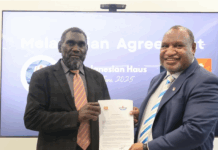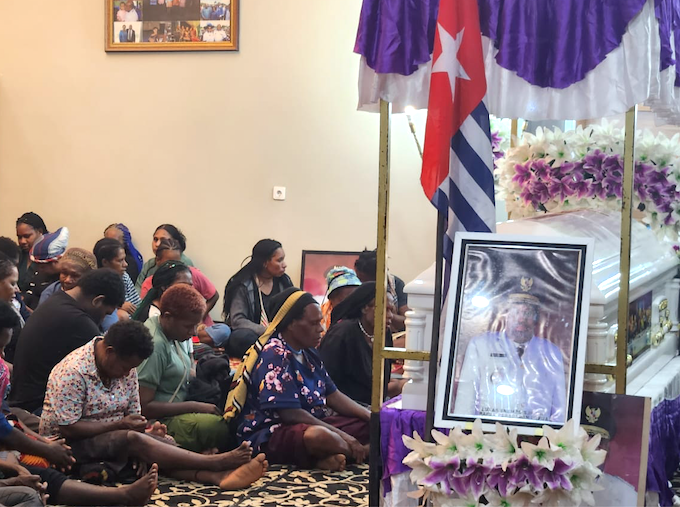
The usually festive Christmas season in West Papua was marred by the death of beloved Papua Governor and Chief Lukas Enembe in an Indonesian military hospital on Boxing Day. The author personally witnessed the emotional village scenes of his burial and accuses the Indonesian authorities of driving him to his death through draconian treatment. Today is one year on from when Enembe was “kidnapped” by authorities from his home and most Papuans believe the former governor never received justice.
SPECIAL REPORT: By Yamin Kogoya in Jayapura
Papuans regard December as both the most sacred and toughest month of the year.
December holds great significance in West Papua for two distinct reasons. First, the date December 1 signifies a pivotal national moment for Papuans, symbolising the birth of their nationhood.
Second, on December 25, the majority of Christian Papuans celebrate the birth of Christ.
- READ MORE: Papuan leader dies in Indonesian military hospital
- Thousands of Papuans gather to farewell Lukas Enembe
- Ex-Papua governor Lukas Enembe dies at 56
- Other Lukas Enembe reports
This date embodies the spirit of Christmas every year, characterised by warmth, family gatherings, and the commemoration of Jesus’ birth, which is profoundly revered among Papuans.
The festive ambiance is heightened by the overlap with the celebration of Papuan independence on December 1, creating a doubly important month for the people.
Papuans raise the Morning Star flag on December 1 every year to commemorate the birth of a new nation statehood, marked originally in 1961. The month of December is a time of celebration and hope — but it is also tragedy and betrayal, making it psychologically and emotionally the most sensitive month for Papuans.
If there were an evil force aiming to target and disrupt the heart of Papuan collective identity, December would be the ideal time for such intentions.
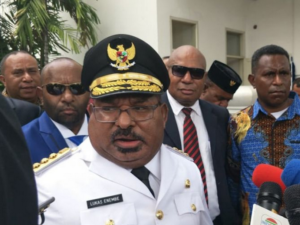
Jakarta accomplished this on 26 December 2023 — Boxing Day as it is known in the West.
Instead of offering a Christmas gift of redemption and healing to the long-suffering Papuans, who have endured torment from the Indonesian elites for more than 60 years, Jakarta tragically presented them with yet another loss — the death of their beloved leader, former Papua Governor and Chief Lukas Enembe.
Enembe died at the Indonesian military hospital in Jakarta at 10 am local time.
Chief Lukas Enembe died standing
In the early hours of Tuesday, December 26, Enembe asked visiting family members to help him stand up from his hospital bed. The next thing he asked was for someone close to him to hug and embrace him.
Before taking his last breath, Enembe looked around and kissed a family member on the cheek. He died while standing and being embraced by his family.
A doctor was immediately summoned to attend Chief Enembe. Tragically, it was too late to save him. He was pronounced dead shortly after.
Since October, he had been receiving treatment at the Indonesian military hospital. He fought courageously both legally and clinically for his life after he was “kidnapped” from his home by the Indonesian Corruption Commission (KPK) and Indonesian security forces on 10 January 2023.
During his prolonged trial, he was severely ill and in and out of courtrooms and military hospitals. Some weeks after falling in KPK’s prison bathroom, he was rushed to hospital but brought straight back to his prison cell.
Court hearings were sometimes cancelled due to his severe illness, while at other times, he briefly appeared online. At times, hearings took hours due to insufficient or lack of evidence, or the complexity of the case against him.
Eventually, Chief Judge Rianto Adam Pontoh and other judges read out the verdict on 19 October 2023, in which he was sentenced to eight years in prison and fined Rp500 million (NZ$51,000) for bribery and gratification related to infrastructure projects in Papua.
One month after the ruling became legally binding, the judge also enforced an extra fine of Rp19.69 billion (NZ$2 million).
He continued to maintain his innocence until the day he died.
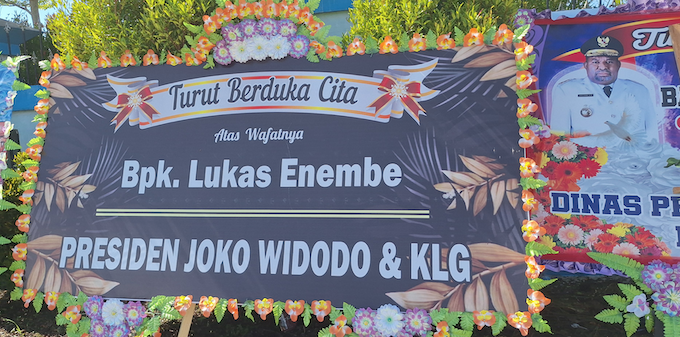
Throughout the proceedings, Enembe asserted that he had never received any form of illicit payment or favour from either businessman cited in the allegations.
Enembe and his legal team emphasised that none of the testimony of the 17 witnesses called during the trial could provide evidence of their involvement in bribery or gratuities in connection with Lukas Enembe.
“During the trial, it was proven very clearly that no witness could explain that I received bribes or gratuities from Rijatono Lakka and Piton Enumbi,” Enembe said through his lawyer Pattyona during the hearing.
In addition to asking for his release, Enembe also asked the judge to unfreeze the accounts of his wife and son which had been frozen when the legal saga began. He said his wife (Yulce Wenda) and son (Astract Bona Timoramo Enembe) needed access to their funds to cover their daily expenses.
This request remains answered until today.
Enembe asked that no party criminalise him anymore. He insisted that he had never laundered money or owned a private jet, as KPK had claimed. Enembe’s lawyer also requested that his client’s honour be restored to prevent further false accusations from emerging.
As Enembe appealed the verdict for justice, he became seriously ill and was admitted to military hospital on October 23. He could nit secure the justice he sought, nor did he receive the medical care he persistently pleaded for.
Singaporean medical specialist tried to save him
Within a week of being admitted to the military hospital, his health rapidly deteriorated.
Upon an emergency family request, Dr Francisco (a senior consultant nephrologist) and Dr Ang (a senior consultant cardiologist from Singapore Royalcare, heart, stroke and cancer) visited Chief Lukas on October 28.
Under his Singaporean doctors’ supervision, Enembe underwent successful dialysis the next day.
Enembe’s family requested a second visit on November 15 in carry out treatment for further dialysis and other complications..
A third visit was scheduled for next week after the doctors were due to return from their holidays. Doctors were in the process of requesting that the chief be transported to Singapore for a kidney transplant.
The doctors were shocked when they learned of the death of their patient — a unique and strong human being they had come to know over the years — when they returned from holiday.
In her tribute to the former governor, Levinia Michael, centre manager of the Singapore medical team, said:
“Mr Governor left us with a broken heart, but he is at eternal peace now. I think he was totally exhausted fighting this year battle with men on earth.”
Requests for immediate medical treatment rejected
There have been numerous letters of appeal sent from the chief himself, the chief’s family, lawyers, and his medical team in Singapore to the KPK’s office, the Indonesian president, and the Indonesian human rights commission, all requesting that Enembe be treated before going on trial. They were simply ignored.
Before his criminalisation in 2022 and subsequent kidnapping in 2023, the torment of this esteemed Papuan leader had already begun, akin to a slow torture like that of a boiling frog.
He confided to those near him that Jakarta’s treatment was a consequence of his opposition to numerous West Papua policies. His staunch pro-Papuan stance, similar to other leaders before him, ultimately sealed his fate.
The real cause of the death of this Papuan leader and many others who died mysteriously in Jakarta will never be known, as Indonesian authorities are unlikely to allow an independent autopsy or investigative analysis to determine the real cause of death.
This lack of accountability and lack of justice only fuels Papuan grievances and strengthens their unwavering commitment to fight for their rights.
Emotional Papuan responses
On the morning of December 28, the governor’s body arrived in Port Numbay, the capital of West Papua, or Hollandia during the Dutch era. (Indonesia later renamed the city Jayapura, meaning “city of victory”.)
As the coffin of the beloved Papuan leader and governor began to exit the airport corridor, chaos erupted. Mourning and upset Papuans attacked the Papua police chief, and the acting governor of Papua, Ridwan Rumasukun’s face was smashed with rocks.
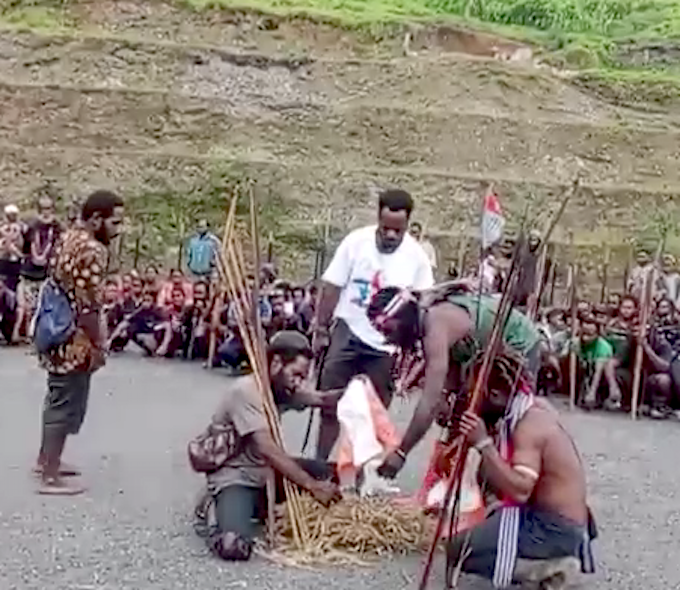
Papuan tribes of the highland village of Mamit, from where Chief Eneme originates, have asked all Indonesian settlers to pack their belongings and return home. His village’s airstrip was closed and there was a threat to burn an aircraft.
Thousands marched while burning Indonesian flags and rejecting Indonesian occupation.
Jayapura and its surroundings completely changed upon his arrival. All shops, supermarkets, malls, and offices were closed. The red-and-white Indonesian flag was flown half-mast.
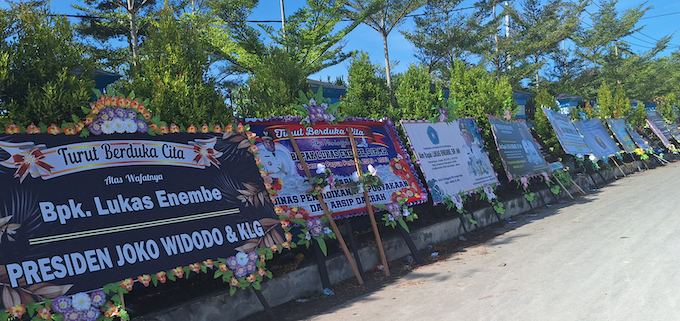
The streets, usually heavily congested with traffic emptied. There were almost no Indonesian settlers visible on the streets. Armed soldiers and policemen were visible everywhere, anticipating any possible uprising, creating an eerie atmosphere of dread and uncertainty.
Despite this, thousands of Papuans commenced their solemn journey, carrying the coffin on foot from Sentani to Koya while flying high West Papua’s Morning Star flag.
Papuan mourners said goodbye to their governor with a mixture of sorrow and pride — a deep sense of sorrow for his tragic death, but also a sense of pride for what he stood for.
Papuan mothers, fathers, and youth stood along roadsides waving, holding posters, and bidding farewell. They addressed him as “goodbye son”, “goodbye father”, “good rest chief of Papuan people”, “father of development”, “father of education”, and “most honest and loved leader of Papuan people”.
The setting mirrored Jesus’ entry into Jerusalem, greeted with palm leaves and resounding hosannas, only to face an unjust trial and execution on a Roman cross.
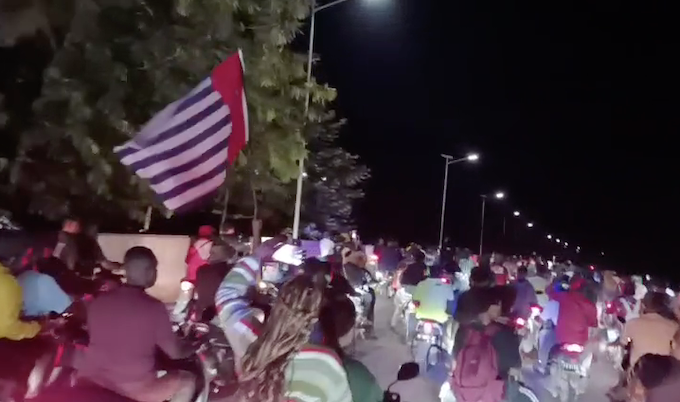
At midnight, thousands of Papuans carried the coffin by foot to the chief’s home, and the funeral continued until the next day. About 20,000 people gathered, and not a single Indonesian settler or high Indonesian or security forces official was visible.
Hundreds of flowers, posters with condolence messages from Indonesian’s highest offices, government departments, NGOs, individual leaders, governors, regencies, ministers, and even President Joko “Jokowi” Widodo himself flooded the chief’s home — which was displayed everywhere from the streets to the walls and fences.
Finally, on the December 29, Governor and Chief Lukas Enembe was buried next to the massive museum he had built dedicated to West Papua and Russia in honour of his favourite 19th century Russian scientist, anthropologist and humanist, Nicholas Miklouho-Maclay, who sought to save Papuans from European racism and savagery in the Papua New Guinea north-eastern city of Madang in the 1870s.
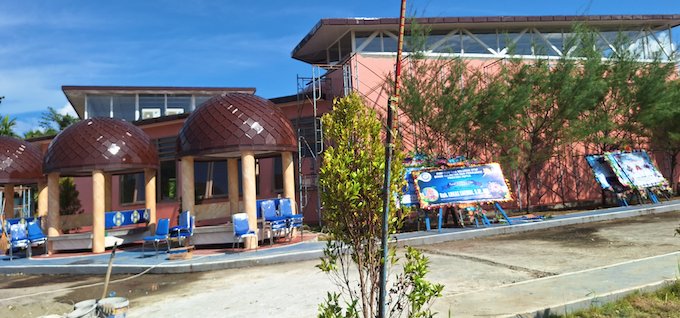
Thousands of TikTok videos, YouTube videos, Facebook posts, and other social media outlets have been flooded with many of his courageous speeches, remarks, and other observations made during his leadership.
Papuans carry leaders’ coffins as sign of respect
West Papua has had only four other Papuan leaders besides Chief Enembe who have been carried on foot by thousands of Papuans as a sign of honour and respect since Indonesian occupation began in 1963.
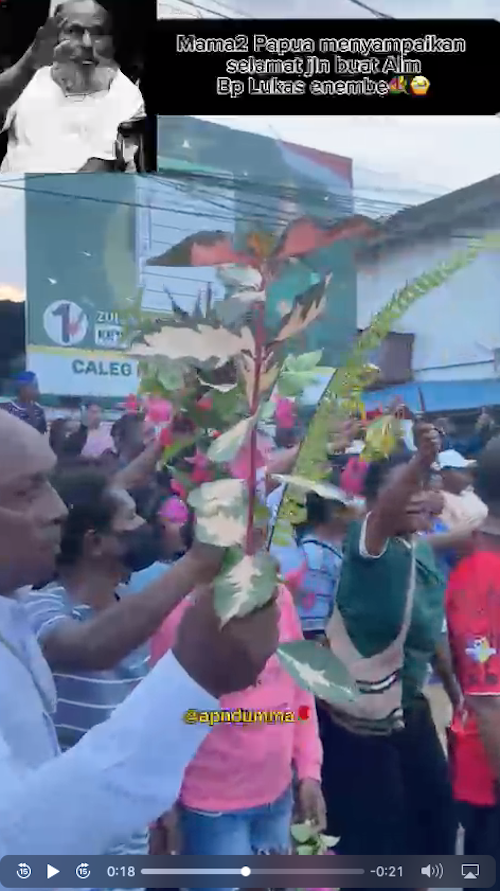
They were Thomas Wainggai in 1996, a prominent West Papua independence advocate; Theys Eluay (2001), killed by Indonesian special forces; Neles Tebay, a Papuan leader who actively sought a peaceful resolution of conflict in West Papua through his Catholic faith and network; and Filep Karma, a prominent West Papuan independence leader and governor.
When Papuans carry their dead leader by foot chanting, singing, dancing with a Morning Star flag, it means these leaders understood the deepest desire and prayers for Papuans people and that desire and prayer is freedom and independence to West Papua.
Chief Lukas Enembe’s uniqueness lies in the fact that he was the only Indonesian colonial governor to receive such honour and respect from Papuans. While the other four honoured were not governors, they were active participants in the independence movement in West Papua.
‘Act of revenge’ by Jakarta against a courageous Papuan leader
Jakarta finally accomplished what it had set out to accomplish for decades when Enembe became a threat to Jakarta’s grip on West Papua — to engineer his death.
A direct assault on Lukas Enembe posed too much risk for Jakarta. Instead, Jakarta systematically criminalised, abducted, subjected him to legal processes, and clinically tortured him until his death on December 26.
Regardless of how vile and malicious a criminal is in Western nations, if they are injured during their illegal acts, are captured alive or half alive, police, paramedics, and ambulances immediately transport them to a hospital to be treated until they are physically and mentally capable of standing a fair trial.
This is protected under the western central legal doctrine — a person must be fit for trial.
Governor and Chief Lukas Enembe was evidently unfit for trial or imprisonment. However, the Indonesian government, using its corruption-fighting institution (KPK), detained an ailing man in prison until he died.
While Indonesians may see his death as a consequence of kidney failure, to Papuans he was tortured to death like a “boiling frog” much as Jakarta is doing to Papuans in West Papua as a whole.
In less than 20-50 years from now, indigenous Papuans will be reduced to a point where they will be unable to reclaim their land. The Papuans themselves must unite and fight for their land.
If the outside world fails to intervene, the fate of the Papuans will be like that of the original indigenous First Nation peoples of Australia, Canada, New Zealand and the United States.
A door of hope for reclaiming their land is becoming narrower and narrower as Jakarta employs every trick to divide them, control them and eliminate them.
The Indonesian government is using highly sophisticated means to exterminate Papuans without the Papuans even being aware of it. Those who are aware are being eliminated.
Chief Lukas Enembe was one of the few leaders who realised Papuans may face this bleak fate.
Yamin Kogoya is a West Papuan academic who has a Master of Applied Anthropology and Participatory Development from the Australian National University and who contributes to Asia Pacific Report. From the Lani tribe in the Papuan Highlands, he is currently living in Brisbane, Queensland, Australia.































